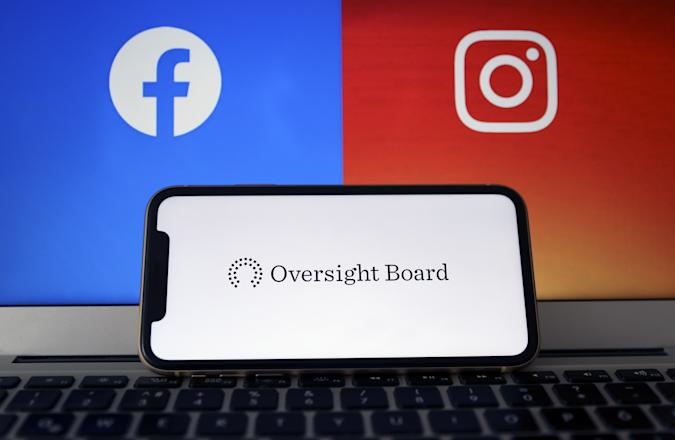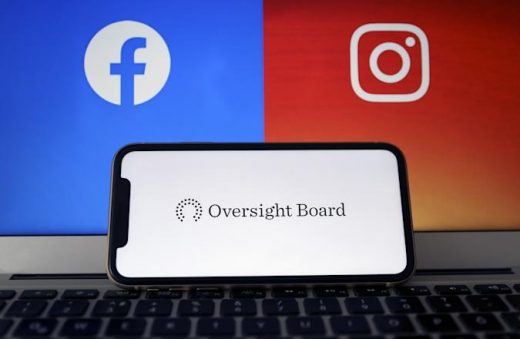Can the Oversight Board force Facebook to follow its own rules?
Can the Oversight Board force Facebook to follow its own rules?
Facebook will have to make the decision it tried so hard to avoid.


Facebook’s Oversight Board finally handed down its most consequential decision to date: whether or not Facebook’s “indefinite” suspension of Donald Trump should be permanent. Except, it only sort of made a decision.
In an unexpected twist, the board said that, while it agreed with Facebook’s initial call to suspend Trump, it disagreed with its handling of the situation, and that the company should be the ones to decide whether Trump should be able to return to the platform. So, once again, the fate of Donald Trump’s Facebook account is up in the air. The social network, led by Nick Clegg, has six months to make up its mind. It could drag on even longer if it’s appealed to the Oversight Board for a second time — something the board’s members readily acknowledged as a distinct possibility.
Unsurprisingly, not everyone was happy with this outcome. The “Real Facebook Oversight Board,” a group of prominent Facebook critics, called the decision “a desperate attempt to have it both ways.” “Today’s decision shows that the Facebook Oversight Board experiment has failed,” it wrote in a statement.
For its part, the Oversight Board has suggested its lack of a clear ruling on Trump was intended to send a strong message to Facebook. “In applying an indeterminate and standardless penalty and then referring this case to the Board to resolve, Facebook seeks to avoid its responsibilities,” the board wrote in its decision. “The Board declines Facebook’s request and insists that Facebook apply and justify a defined penalty.” In other words: When it comes to Trump, Facebook needs to clean up its own mess.
The Trump mess
Whatever your opinion of the Oversight Board, this particular decision seems to have caught nearly everyone by surprise. Some have wondered if the board was reacting to widespread criticism that the organization exists merely to provide political cover for Facebook. Sending highly controversial and other “borderline” cases to the group is, after all, a convenient way for Facebook to avoid making hard and inevitably unpopular decisions (particularly ones that might draw additional regulatory scrutiny).
Naturally, Facebook disagrees. “We are trying to hold the decisions that Facebook takes as a private company to the fullest possible account and make it transparent and accountable to an independent body,” Clegg said following the board’s decision.
But the Oversight Board’s decision to hand things back to Facebook speaks to issues that run much deeper than just Trump. One of the most notable issues raised by the Oversight Board in its 12,000-word decision is that Facebook isn’t particularly good at consistently enforcing its own policies, especially when it comes to politicians and other influential figures.
During a call with reporters, both Oversight Board co-chairs, Michale McConnell and Helle Thorning-Schmidt, repeatedly criticized Facebook’s ability to apply its own rules in a way that makes sense. “The Oversight Board is telling Facebook that they can’t just invent new unwritten rules when it suits them,” Thorning-Schmidt said. McConnell said that Trump’s suspension was merely one example of Facebook’s “ad hoc-ery,” noting that the board has received more than 20,000 appeals from users, many of whom don’t understand the social network’s policies or reasoning for taking action against their accounts.
Influencing Facebook
Merely pointing out the holes in Facebook’s policies only goes so far, though. The company has for years (often credibly) been accused of making up its own rules to accommodate Trump or avoid a politically perilous decision. That the Oversight Board is now echoing some of those same criticisms changes little.
But the board does have some ability to influence Facebook’s rules, including how it treats Trump. Besides the binary take down/leave up decisions, the group also makes policy recommendations alongside each case. Unlike the specific content moderation issues, Facebook isn’t required to do what the board says, but it’s required to respond and provide an explanation.
It’s these recommendations where the Oversight Board hopes to prompt meaningful change. In the case of Trump’s suspension, it made several recommendations. Among them:
-
Facebook should “publicly explain the rules that it uses when it imposes account-level sanctions against influential users.”
-
“When Facebook implements special procedures that apply to influential users, these should be well documented.”
-
“Facebook should explain in its Community Standards and Guidelines its strikes and penalties process for restricting profiles, pages, groups and accounts on Facebook and Instagram in a clear, comprehensive, and accessible manner.”
-
“Facebook must resist pressure from governments to silence their political opposition. In evaluating political speech from highly influential users, Facebook should rapidly escalate the content moderation process to specialized staff who are familiar with the linguistic and political context and insulated from political and economic interference and undue influence.”
-
“When posts by influential users pose a high probability of imminent harm, as assessed under international human rights standards, Facebook should take action to enforce its rules quickly.”
-
“Facebook should undertake a comprehensive review of its potential contribution to the narrative of electoral fraud and the exacerbated tensions that culminated in the violence in the United States on January 6, 2021. This should be an open reflection on the design and policy choices that Facebook has made that may enable its platform to be abused.”
But Facebook has already indicated that it’s unwilling to fully cooperate. In its decision, the board says that the company failed to answer several crucial questions, including several that speak to the very issues it raises in its policy recommendations.
For example, the board states that Facebook wouldn’t answer key questions about how News Feed or other Facebook features may have amplified Trump’s posts, or whether the company intends to research “those design decisions in relation to the events of January 6, 2021.” Those questions speak to some of the most fundamental issues surrounding Trump’s suspension, including Facebook’s role in failing to prevent the “Stop the Steal” movement.
Likewise, the board said Facebook also declined to answer questions relating to its treatment of other politicians, and whether it had been “contacted by political officeholders or their staff about the suspension of Mr. Trump’s accounts,” or whether the suspension affects political advertising. According to the board, Facebook said some of these requests were not “reasonably required” under the rules that govern the Oversight Board.
All that, too, raises questions about how much influence Facebook is willing to let the Oversight Board have. The company’s treatment for elected officials, its rules for political ads and the consequences of its algorithms are some of the most consequential issues it’s currently grappling with. If Facebook was unwilling to even answer questions about these topics, it seems unlikely it would fully embrace all of the Oversight Board’s policy changes.
Moreover, Facebook already has a mixed track record in responding to policy suggestions from the board. So far, the company has only issued one set of responses to the board. And while it said it was “committed to action” in several areas, it made very few concrete changes. If it again declines to commit to specific changes in this case, then it will be further proof that the Oversight Board’s biggest critics are right: It can’t regulate Facebook after all.
(38)


